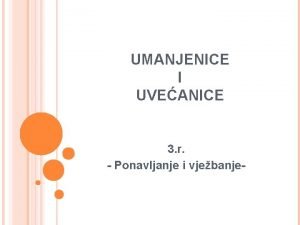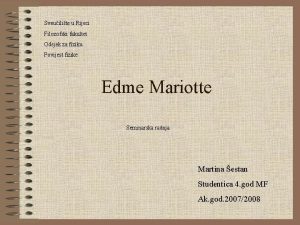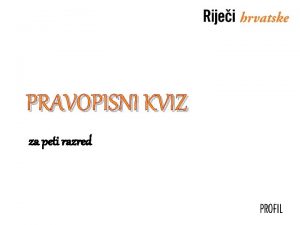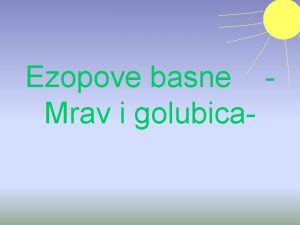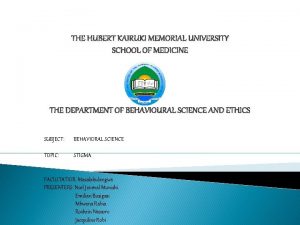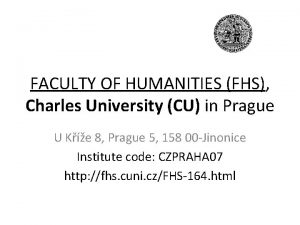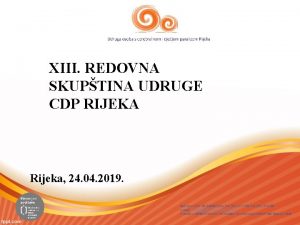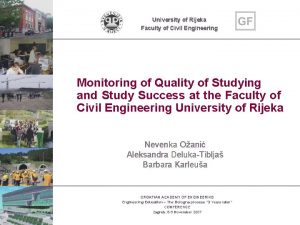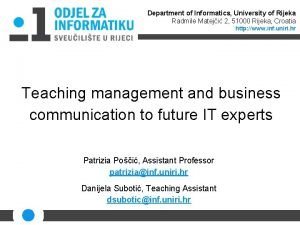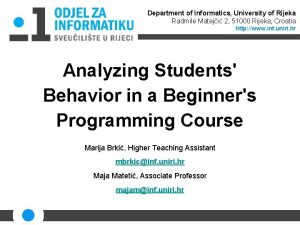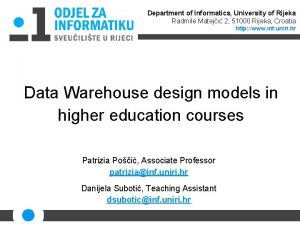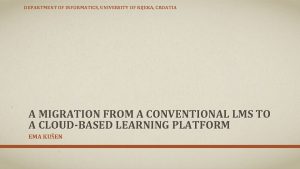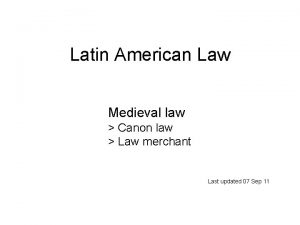Faculty of Law University of Rijeka Department of


































- Slides: 34

Faculty of Law, University of Rijeka Department of Economics Ivan Rubinić, mag. oec. To BIT or not to BID? (Theoretical and practical analysis of virtual currencies in case of Bitcoin) Long Beach, 2014.

What is Bitcoin? (Introduction) • Bitcoin is software-based online payment system described by Satoshi Nakamoto in 2008. and introduced as open-source software in 2009. • Payments are recorded in a public ledger using its own unit of account (Bitcoin). • It is a form of digital currency (physical form is absent), created and held electronically. It can be used to buy things electronically and in that sense it is no different than conventional dollars. • Bitcoin is commonly referred to as cryptocurrency and it can be divided into smaller unit called Satoshi (one hundred milionth of a BTC). Faculty of Law, University of Rijeka 2

What is it based on? (coindesk. com) • System is runned by The Bitcoin protocol • It is based on mathematics unlike conventional currencies that had been based on fixed quantity of metal (gold, silver…) or fiat currencies. • Bitcoin has several features that set it apart from fiat currencies: 1. 2. 3. 4. 5. 6. It is decentralized It is easy to set up and it is fast It is anonymous It is completely transparent Transaction fees are miniscule Transactions are irreversible Faculty of Law, University of Rijeka 3

1. It’s decentralized • Base for the Bitcoin protocol is a peer-to-peer system which means that there is no need for a third party. • Therefore, in theory, bitcoin network is not controled by central authority (fully decentralized monetary system). • Bitcoins are being created by a community of people that anyone can join. • In theory, there is no authority (financial institution) which can tinker with monetary policy and in that sense devalue or revalue Bitcoin currency. Faculty of Law, University of Rijeka 4

2. It’s anonymus and transparent • Bitcoins are stored in wallet with digital credentials for your bitcoin holdings and allows you to access them. • Wallet uses public-key cryptography, in which two keys, one public and one private are generated. Public key can be thought of as an account number or name and the private key, ownership credentials. • Bitcoin is transferred to the next owner when the next owner gives a public key and previous owner uses his private key to publish a record into system announcing that the ownership has changed to the new public key. • Bitcoin protocol stores details of every single transaction that occurred in the network in huge version of general ledger (Block chain). Faculty of Law, University of Rijeka 5

3. Negligible fees and irreversible process • Bitcoin doesn’t charge fees for either national or international transfers. • Bitcoin is not the first private money, not the first digital currency, and not first currency based on cryptography, but it has been the first to rely on peer to peer network decentralization to avoid double spending. • Bitcoin protects against double spending by verifying each transaction added to the block chain to ensure that the inputs for the transaction had not previously already been spent. Faculty of Law, University of Rijeka 6

How are Bitcoins created - Mining process • Miners use special software to solve math problems (Bitcoin algorithm), and upon completing the task they receive certain amount of coins. • They are created each time a user discovers new block (finds hash value). • Software is creating new units until it reaches amount of 21 million unites (currency with Finite Supply). • The rate of block creation is approximately consistant over time (6 per hour) with 50 % reduction every four years. • Halving (in theory) continues until 2110 -2140 when 21 million BTC have been issued. Faculty of Law, University of Rijeka 7

Total bitcoin unit supply over time Number of units in circulation (Projection) Period Faculty of Law, University of Rijeka data source: bitcoin. it 8

How can one obtain Bitcoins? 1. Earn Bitcoins from mining 2. Earn Bitcoins by accepting them as a means of payment (Time magazine: „All transactions using digital or alternative currencies had been illegal in California until 30. 06. 2014” http: //time. com/2942212/california-bitcoin-legalize/) 3. 4. 5. 6. Earn Bitcoins trough trading Earn Bitcoins as a regular income Earn Bitcoin from interest payments Various ways (donations, gambling, getting tipped, completing tasks on websites. . . ) Faculty of Law, University of Rijeka 9

Why price of bitcoins soared and why it became the world pionner in virtual currency field? Faculty of Law, University of Rijeka data source: quandl. com and bundesbank. de, own calculations 10

Why price of bitcoins soared and why it became the world pionner in virtual currency field? • Financial crisis that caused meltdown of the economy started 2008 -2009. • It caused a transfer of assets form real-estate and financial sphere to investment into commodities that are traditionally considered as a stable store of values. • Historically, Gold is best known commodity of that type because quantity of this metal is limited and, therefore, it is great way how to hedge your portfolio in times when usage of expansive monetary policy is highly likely. • In this sense, bitcoin is similar to gold (except there is no intrinsic value) and when the value of gold started to decrease due to the price roof that it had reached and partial recovery of financial market, value of bitcoin soared because it was cleverly designed financial product with finite quantity. Faculty of Law, University of Rijeka 11

Theoretical and tehnical problems which goes against favour of bitcoin usage: 1. 2. 3. 4. Illegal activities, speculations and nature of this currency, Theoretical base for digital currency usage, Regulation and taxation issue, Disputable status of independent and decentralized currency, 5. Mining problems, 6. Skepticism towards implementation of new, unregulated, theologies in finance sphere. Faculty of Law, University of Rijeka 12

Illegal activities, speculations and nature of bitcoin currency • Can currency be anonymous and transparent at the same time? (Slide 5) • Why would somebody give you approximately 27, 000 $ for solving impractical mathematical equations? • According to Forbes (2014. ), currently, more than 90 percent of bitcoin accounts are in a buy-and-hold mode! „At some point in the growth of a boom all aspects of property ownership become irrelevant except the prospect for an early rise in price. Income from the property, or enjoyment of its use, or even its long-run worth is now academic. ” J. K. Galbraith (The Great Crash 1929. ) Faculty of Law, University of Rijeka 13

Brief history of bitcoin commodity Source: selected data available at historyofbitcoin. org Date 2007 18. 8. 2008 3. 1. 2009 12. 1. 2009 5. 10. 2009 6. 2. 2010 17. 7. 2010 Event Satoshi began working on the Bitcoin concept Bitcoin is registered The Genesis Block is mined First Bitcoin transaction An exchange rate is established A currency exchange is born Mt. Gox is established 15. 8. 2010 A vulnerability in the system is discovered and exploited, resulting in the generation of 184 billion Bitcoins 18. 9. 2010 29. 9. 2010 28. 10. 2010 9. 12. 2010 2011 28. 1. 2011 9. 2. 2011 12. 4. 2011 First collective mining starts Another exploit discovered First ever short sale First call option contract sold Silk Road opens for business 25% of total Bitcoins generated Bitcoin reaches parity with USD (1: 1) First put option sold Faculty of Law, University of Rijeka 14

Brief history of bitcoin commodity Source: selected data available at historyofbitcoin. org Date 12. 6. 2011 13. 7. 2011 19. 7. 2011 26. 7. 2011 5. 8. 2011 6. 9. 2011 Event The Great Bubble of 2011 25, 000 BTC theft reported Major breach at Mt. Gox Bitomat (Poland) loses 17, 000 Bitcoins My. Bitcoin loses 150, 000 Bitcoins Creation of physical Bitcoins 13. 2. 2012 Second largest Bitcoin exchange shuts down 1. 3. 2012 9. 5. 2012 11. 5. 2012 3. 9. 2012 Linode hacked 46, 000 BTC stolen FBI report on Bitcoin leaked Bitcoinica hacked (18, 000 BTC) Bitfloor hacked (24, 000 BTC) Bitcoin Savings and Trust investigated for running Ponzi scheme Bit. Instant hacked (12, 000 $) Glitch causes halt in transactions Market cap reaches $ 1 billion Bitcoin surpasses $100 Bitcoin Central is hacked Gaming company caught secretly mining Bitcoins from customer computers 24. 9. 2012 8. 3. 2013 11. 3. 2013 28. 3. 2013 1. 4. 2013 20. 4. 2013 1. 5. 2013 Faculty of Law, University of Rijeka 15

Brief history of bitcoin commodity Source: selected data available at historyofbitcoin. org Date 2. 5. 2013 14. 5. 2013 18. 5. 2013 23. 5. 2013 1. 6. 2013 6. 8. 2013 12. 8. 2013 20. 8. 2013 2. 10. 2013 31. 10. 2013 13. 11. 2013 19. 11. 2013 2. 12. 2013 5. 12. 2013 26. 1. 2014 12. 09. 2014 Event First Bitcoin ATM (San Diego) Mt. Gox funds seized by Homeland Online casino that accepts Bitcoin is founded Bitcoin central gets hacked Winklevoss Bitcoin Trust filed Bitcoin ruled currency by Texas judge 22 Bitcoin companies subpoenaed Bitcoin ruled private money in Germany FBI shuts down Silk Road (3. 6 milllion USD seized) Bitcoin. Talk. org hacked Bit. Market. eu closes the doors Senate hearing of potential Bitcoin risks and threats Bitcoin goes above $ 1000 96, 000 Bitcoins are stolen from Sheep Marketplace China bans Bitcoin transactions Bit. Instant CEO charged with money laundering First bitcoin swap approved Faculty of Law, University of Rijeka 16

Conventional money theory (simplified) • Money is commodity that has a status of universal equivalent in trade. • Money functions: 1. Medium of Exchange 2. Store of Value 3. Unit of Account Gold **** *** Fiat currencies ***** *** Cryptocurrencies **** ? ? ? • Schlichter, D. (2011): „All additional functions that can be assigned to money are the result of money being the accepted medium of exchange. ” Faculty of Law, University of Rijeka 17

Money circulation Mx. V=Px. Q • • M – total amount of money in circulation V – velocity of money P – price level Q – indeks of real value of final expenditures • Bitcoin as currency increases amount of money and hence leads to increasing price levels (V and Q constant). • Since bitcoin is inherently deflationary it will benefit in a way that its usage will cause value decline of other currencies while bitcoin will experience rise. Faculty of Law, University of Rijeka 18

Theoretical background? • Theoretical background for bitcoin currency can be found within Hayek’s work „Denationalization of money, free banking and inflation targeting” 1977. (Claim of bitcoin advocates). • Hayek claims that the government should be depived of its monopol to issue of money. • Central argument is that a price level stability can be achieved only by removing national governments of their monopoly to create money. Faculty of Law, University of Rijeka 19

• Hayek suggests that allowing private enterprise to supply public with other media of exchange is a solution to monopoly problem, and that we need a free market with concurrent currencies. • In his model, creation of money would be under control of private banks and they would supply the market with various types of currencies, therefore, creating competitiveness. • In order to acchieve price stability every bank should tie its liabilities to certain basket of commodities for keeping its rate of change in-line with its promises. • This theory faces strong objections which can be the subject of another lecture, but for now the important fact is that Hayek’s theory is not appropriate in case of bitcoin. BASED ON FOLLOWING ARGUMENTS, WE WILL CONCLUDE THAT THERE IS NO ECONOMIC THEORY THAT WOULD APPROVE AND EXPLAIN USAGE OF BITCOIN CURRENCY Faculty of Law, University of Rijeka 20

USD/Bitcoin Weighted Price (Volatility analysis) China restricted Bitcoin exchange for local RMB Russia defined Bitcoin as dubios activity Mt. Gox filed for bankrupcy (theft of 477 million USD in BTC) Soaring caused by wide acceptance of Bitcoin Faculty of Law, University of Rijeka Source: quandl. com 21

Volatility dilemma • How to achieve price stability with inelastic fixed supply of bitcoins? Faculty of Law, University of Rijeka Source: Ametrano, F. M. 2014. „Hayek Money” p. 19 22

Volatility dilemma solution • If obtaining price stability is main target supply of bitcoin should be adjusted (fixed) to the price of goods. • The monetary base increment should be distributed pro-quota to every digital wallet, without unfair wealth distribution. • It is farly easy to achieve ballance if we consider only one good in a model, however, if monetary policy targets commodity price stability as basket of goods, implementation is becoming complicated! • What if a price of good decreases and amount of coins in wallet is not big enough to adjust falling price? • It also implies that final quantity of bitcoins is changing which is contradictory to the main concept. Faculty of Law, University of Rijeka 23

Other dilemmas • Unknown issuer • Currency (Bank) Runs and absence of deposit insurance • Bitcoin nature as a global phenomenon • Physical currency as a necessity • Deflationary spiral problem Faculty of Law, University of Rijeka 24

Regulation and taxation issue Commodity? Currency? Private money? Property? Security? • Federal regulators in the United States have generally not issued specific guidance on Bitcoin’s status. • „Bitcoin is a currency or form of money” United States District Court, Texas, 2013. • „IRS Boosts Bitcoin’s Status As Speculative Investment” Money Management, 2014. • „IRS: Bitcoin is property not currency” Bloomberg, 2014. Faculty of Law, University of Rijeka 25

Which institution can regulate virtual currencies? FED? SEC? • "I think it's important to understand that this is a payment innovation that's taking place entirely outside the banking industry, The Federal Reserve simply does not have the authority to supervise or regulate Bitcoin in any way. „ • Question: is bitcoin a security? • The strongest regulatory hook for deeming Bitcoin to be a security may be categorizing it a an "investment contract”. Federal Reserve Chair Janet Yellen Faculty of Law, University of Rijeka 26

Which institution can regulate virtual currencies? US TREASURY? CFTC? • „If Bitcoin Remains Impractical, Treasury Will Let it Be” Bloomberg. Business. Week, 2014. • Investing in Bitcoins could come under CFTC jurisdiction as being a commodity for future delivery • CFTC would have a colorable claim to regulate derivative products of Bitcoins (i. e. , Bitcoin futures, swaps, rolling spot Bitcoin transactions, etc. ). • However, market for those products remains small and outside of the United States. Faculty of Law, University of Rijeka 27

Legality of Bitcoin by country • • PERMISSIVE CONTENTIOUS HOSTILE UNKNOWN Source: bitlegal. io Faculty of Law, University of Rijeka 28

• There are three ways how bitcoin generate income: 1. Since value of a bitcoin fluctuates, one can generate net income selling them at the higher price than the original purrchase price (capital gains taxation). 2. If they are received by merchants sa payment for goods and services. 3. Bitcoins obtained through mining activities are a subject of standard income taxation. • Can a country have an adequate taxation program if regulatory framework is not defined and if status of „currency or commodity” is unknown? • If take the anonymity of bitcoin into account then one can simply deduct that tax evasion is not only feasible but inevitable. Faculty of Law, University of Rijeka 29

Does statement that bitcoin is independent and decentralized currency holds water? • Independence is defined as freedom from the control, influence… • As long as bitcoin is a part of the society, it cannot be independent because a simple ban from one relevant country can cause collapse of the currency. • What will happen when a bitcoin will eventually confront the full weight of the regulatory state? Faculty of Law, University of Rijeka 30

5. Mining problems • Using computing power of third parties to achieve faster mining performance (without knowledge and consent of the third party) • Distributed Denial of Service Attacks (DDo. S) • The 51% cartel attack • A Goldfinger attack Faculty of Law, University of Rijeka 31

Skepticism towards implementation of new theologies in finance sphere • “Not only have individual financial institutions become less vulnerable to shocks from underlying risk factors, but also the financial system as a whole has become more resilient. ” (2004. ) • „I really didn't get it until very late in 2005 and 2006. “ (2007. ) Faculty of Law, University of Rijeka 32

Conclusion ADVANTAGES • It is easy to set up and it is fast • Low and irreversible transaction fees • Without central authority? ? ? (possible disadvantage) DISADVANTAGES New and uninvestigated financial product History is full of illegal and questionable activity Absence of relevant theoretical background Highly volatile value and an unknown issuer Undefined legal status Unregulated commodity and absence of consumer protection • Anonymity and blurry taxation status • Illegal or undefined in most countries of the world • • • Faculty of Law, University of Rijeka 33

Thank you for your attention! Questions, comments or remarks? For any further questions author is at your disposal via email: irubinic 1@pravri. hr Faculty of Law, University of Rijeka 34
 Faculty of law of the university of zagreb
Faculty of law of the university of zagreb University of montenegro faculty of law
University of montenegro faculty of law Department of law university of jammu
Department of law university of jammu Nit calicut chemistry department faculty
Nit calicut chemistry department faculty Opće geografske karte
Opće geografske karte List uvećanica
List uvećanica Fakultet za fiziku rijeka
Fakultet za fiziku rijeka Delta nila slike
Delta nila slike Pravopisni kviz
Pravopisni kviz Najveća europska konurbacija
Najveća europska konurbacija Podzoli u hrvatskoj
Podzoli u hrvatskoj Komparacija pridjeva vrijedan
Komparacija pridjeva vrijedan Rijeka population
Rijeka population Lamblijaza
Lamblijaza Pet hrvatskih rijeka koja pripadaju crnomorskom slivu
Pet hrvatskih rijeka koja pripadaju crnomorskom slivu Pia rijeka
Pia rijeka Najveća europska rijeka
Najveća europska rijeka Tunai rijeka
Tunai rijeka Crnomorski slijev
Crnomorski slijev Srednja škola andrije ljudevita adamića rijeka cijena
Srednja škola andrije ljudevita adamića rijeka cijena Načinski prilozi
Načinski prilozi Herszon kherson maritime college of merchant marine fleet
Herszon kherson maritime college of merchant marine fleet University of bridgeport computer science
University of bridgeport computer science University of bridgeport computer science faculty
University of bridgeport computer science faculty Hubert kairuki memorial university faculty of medicine
Hubert kairuki memorial university faculty of medicine Solid thyroid nodule
Solid thyroid nodule Applied medical sciences
Applied medical sciences Fsu cybersecurity major
Fsu cybersecurity major Mendel university faculty of business and economics
Mendel university faculty of business and economics Singularity university faculty
Singularity university faculty Territorial matrix vs interterritorial matrix
Territorial matrix vs interterritorial matrix Ascaris lumbricoides ova
Ascaris lumbricoides ova Faculty of engineering university of porto
Faculty of engineering university of porto Charles university faculty of humanities
Charles university faculty of humanities Faculty of veterinary medicine cairo university logo
Faculty of veterinary medicine cairo university logo





